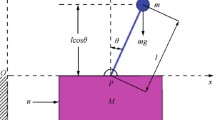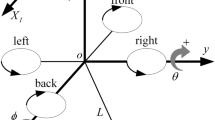Abstract
It is proposed here to use a robust tracking design based on adaptive fuzzy control technique to control a class of multi-input-multi-output (MIMO) nonlinear systems with time delayed uncertainty in which each uncertainty is assumed to be bounded by an unknown gain. This technique will overcome modeling inaccuracies, such as drag and friction losses, effect of time delayed uncertainty, as well as parameter uncertainties. The proposed control law is based on indirect adaptive fuzzy control. A fuzzy model is used to approximate the dynamics of the nonlinear MIMO system; then, two on-line estimation schemes are developed to overcome the nonlinearities and identify the gains of the delayed state uncertainties, simultaneously. The advantage of employing an adaptive fuzzy system is the use of linear analytical results instead of estimating nonlinear system functions with an online update law. The adaptive fuzzy scheme uses a Variable Structure (VS) scheme to resolve the system uncertainties, time delayed uncertainty and the external disturbances such that H∞ tracking performance is achieved. The control laws are derived based on a Lyapunov criterion and the Riccati-inequality such that all states of the system are uniformly ultimately bounded (UUB). Therefore, the effect can be reduced to any prescribed level to achieve H ∞ tracking performance. A two-connected inverted pendulums system on carts and a two-degree-of-freedom mass-spring-damper system are used to validate the performance of the proposed fuzzy technique for the control of MIMO nonlinear systems.
Similar content being viewed by others
References
W. S. Yu, T. S. Wu, and C. C. Chao, “An observerbased indirect adaptive fuzzy control for rolling cart systems,” IEEE Trans. on Control System, vol. 19, no. 5, pp. 1225–1235, 2011.
W. -S. Yu and T.-S. Wu, “Fuzzy adaptive observerbased control for Chua’s circuit with output time delay,” IET Circuits, Devices and Syst., vol. 5, no. 4, pp. 303–320, 2011.
C. -S. Tseng, “Model reference output feedback fuzzy tracking control design for nonlinear discretetime systems with time-delay,” IEEE Trans. on Fuzzy Systems, vol. 14, no. 1, pp. 58–70, 2006.
W. Chen and J. Li, “Adaptive output feedback control for nonlinear time-delay systems using neural network,” Journal of Control Theory and Applications, vol. 4, pp. 313–320, 2006.
S. K. Nguang, “Robust stabilization of a class of time-delay nonlinear systems,” IEEE Trans. on Automatic Control, vol. 45, no. 4, pp. 756–762, April 2000.
H. -S. Shin, H.-L. Choi, and J.-T. Lim, “Feedback linearisation of uncertain nonlinear systems with time delay,” IEE Proc. Control Theory and Applications, vol. 153, no. 6, pp. 732–736, November 2006.
T. Li and X. L. Ye, “Improved stability criteria of neural networks with time-varying delays: an augmented LKF approach,” Neurocomputing, vol. 73, pp. 1038–1047, January 2010.
T. Li, L. Guo, and L. Wu, “Simplified approach to the asymptotical stability of linear systems with interval time-varying delay,” IET Proc. Control theory and Application, vol. 3, no. 2, pp. 252–260, February 2009.
Y. -J. Liu, C. L. P. Chen, G.-X. Wen, and S. C. Tong, “Adaptive neural output feedback tracking control for a class of uncertain discrete-time nonlinear systems,” IEEE Trans. on Neural Networks, vol. 22, no. 7, pp. 1162–1167, July 2011.
T.-H. S. Li and Y.-C. Huang, “Adaptive neural network decentralized backstepping outputfeedback control for nonlinear large-scale systems with time delays,” IEEE Trans. on Neural Networks, vol. 22, no. 7, pp. 1073–1086, July 2011.
B. Chen, X. Liu, K. Liu, and C. Lin, “Novel adaptive neural control design for nonlinear MIMO time-delay systems,” Automatica, vol. 45, no. 6, pp. 1554–1560, June 2009.
R. Wang, K. Mei, C. Chen, Y. Li, H. Meu, and Z. Yu, “Adaptive neural control for MIMO nonlinear systems with state time-varying delay,” Journal of Control Theory and Applications, vol. 10, no. 3, pp. 309–318, May 2010.
Z. B. Du and T. C. Lin, “Adaptive fuzzy tracking control for MIMO uncertain nonlinear time-delay systems,” International Journal of Advancements in Computing Technology, vol. 3, no. 6, pp. 10–20, August 2011.
W. S. Yu, “H ∞ Tracking-based adaptive fuzzyneural control for MIMO uncertain robotic systems with time delays,” Fuzzy Sets and System, vol. 146, no. 3, pp. 375–401, 2004.
S. C. Tong, C. Y. Li, and Y. M. Li, “Fuzzy adaptive observer backstepping control for MIMO nonlinear systems,” Fuzzy Sets and Systems, vol. 160, no. 19, pp. 2755–2775, 2009.
Y. -J. Liu, W. Wang, S.-C. Tong, and Y.-S. Liu, “Robust adaptive tracking control for nonlinear systems based on bounds of fuzzy approximation parameters,” IEEE Trans. on Systems, Man, and Cybernetics A, Systems and Humans, vol. 40, no. 1, pp. 2755–2775, January 2010.
Y.-J. Liu and W. Wang, “Adaptive fuzzy control for a class of uncertain nonaffine nonlinear systems,” Information Sciences, vol. 177, no. 18, pp. 3901–3917, 2007.
T.-H. S. Li and Y.-C. Huang, “MIMO adaptive fuzzy terminal sliding-mode controller for robotic manipulators,” Information Sciences, vol. 180, no. 23, pp. 4641–4660, December 2010.
V. Nekoukar and A. Erfanian, “Adaptive fuzzy terminal sliding mode control for a class of MIMO uncertain nonlinear systems” Fuzzy Sets and Systems, vol. 179, no. 1, pp. 34–49, September 2011.
A. Boulkroune, M. Tadjine, M. M’Saad, and M. Farza, “Fuzzy adaptive controller for MIMO nonlinear systems with known and unknown control direction” Fuzzy Sets and Systems, vol. 161, no. 6, pp. 797–820, March 2010.
H. X. Li and S. C. Tong, “A hybrid adaptive fuzzy control for a class of nonlinear MIMO systems,” IEEE Trans. on Fuzzy Systems, vol. 11, no. 1, pp. 24–34. 2003.
S. C. Tong and Y. M. Li, “Observer-based fuzzy adaptive control for strict-feedback nonlinear systems,” Fuzzy Sets and Systems, vol. 160, no. 12, pp. 1749–1764, 2009.
S. C. Tong, X.-L. He, and H.-G. Zhang, “A combined backstepping and small-gain approach to robust adaptive fuzzy output feedback control,” IEEE Trans. on Fuzzy Systems, vol. 17, no. 5, pp. 1059–1069, 2009.
Q. Zhou, P. Shi, J. J. Lu, and S. Y. Xu, “Adaptive output feedback fuzzy tracking control for a class of nonlinear systems,” IEEE Trans. on Fuzzy Systems, vol. 19, no. 5, pp. 972–982, 2011.
A. S. Shiriaeva, O. Egelandb, H. Ludvigsenb, and A. L. Fradkovc, “VSS-version of energy-based control for swinging up a pendulum,” Systems & Control Letters, vol. 44, no. 1, pp. 45–56, September 2001.
H. F. Ho, Y. K. Wonga, and A. B. Rad, “Adaptive fuzzy sliding mode control with chattering elimination for nonlinear SISO systems,” Simulation Modelling Practice and Theory, vol. 17, no. 7, pp. 1199–1210, August 2009.
Y. C. Chang, “Adaptive fuzzy-based tracking control for nonlinear SISO system via VSS and H ∞ approaches,,” IEEE Trans. on Fuzzy Systems, vol. 9, no. 2, pp. 278–292, 2001.
Y. C. Chang, “Robust tracking control for nonlinear MIMO systems via fuzzy approaches,” Automatica, vol. 36, no. 10, pp. 1535–1545, October 2000.
Y. C. Chang, “An adaptive H ∞ tracking control for a class of nonlinear multiple-input-multiple-output (MIMO) systems,” IEEE Trans. on Automatic Control, vol. 46, no. 9, pp. 1432–1437, 2001.
T. C. Lin, C. H. Wang, and H. L. Liu, “Observerbased indirect adaptive fuzzy-neural tracking control for nonlinear SISO system using VSS and H ∞ approaches,” Fuzzy Sets and System, vol. 143, no. 2, pp. 211–232, April 2004.
H. K. Khalil, “Adaptive output feedback control of non-linear systems represented by input-output models,” IEEE Trans. on Automatic Control, vol. 41, no. 2, pp. 177–188, 1996.
H. K. Lam, F. H. F. Leung, and Y. S. Lee, “Design of a switching controller for nonlinear systems with unknown parameters based on a fuzzy logic approach,” IEEE Trans. on Systems, Man, and Cybernetics B, vol. 34, no. 2, pp. 1068–1074, 2004.
Y. J. Liu, S. C. Tong, and T. S. Li, “Observer-based adaptive fuzzy tracking control for a class of uncertain nonlinear MIMO systems,” Fuzzy Sets and System, vol. 164, no. 1, pp. 25–44, February 2011.
L. X. Wang, Adaptive Fuzzy Systems and Control: Design and Stability Analysis, Prentice-Hall, Englewood Cliffs, NJ, 1994.
Author information
Authors and Affiliations
Corresponding author
Additional information
Recommended by Editorial Board member Juhoon Back under the direction of Editor Ju Hyun Park.
The authors would like to thank the anonymous reviewers for their helpful suggestions and valuable comments. This work has been supported by Qatar National Research Fund under NPRP Grant 4-537-2-200 and 4-536-2-199.
Tzu-Sung Wu was born in Taiwan, Republic of China in 1979. He received his B.S. degree in Electronic Engineering from Lunghwa University of Science and Technology, Taoyuan, Taiwan, in 2003, an M.S. degree in Electrical Engineering from Tatung University, Taipei, Taiwan in 2005 and a Ph.D. degree in Electrical Engineering from Tatung University, Taipei, Taiwan in 2011. He is currently a postdoctoral researcher in the Department of Mechanical Engineering at the University of Texas A & M, Doha, Qatar. His research interests include fuzzy logic, intelligent systems, and learning algorithms.
Mansour Karkoub received his B.S. degree in Mechanical Engineering with Highest Distinction in 1984, an M.S.M.E. in 1990, and a Ph.D. in 1994 all from the University of Minnesota, Minneapolis, Minnesota. He held a faculty position at Kuwait University from 1994–2005 and INRIA, France from 2002–2003. Also, he held faculty position at the Petroleum Institute in Abu Dhabi, UAE from 2005–2009. Currently, he is with the Mechanical Engineering Department, Texas A & M University, Qatar. His research interests are robust control, robotics, mechatronics, and vibration engineering.
Chien-Ting Chen was born in Taiwan, R.O.C., in 1986. He received his B.S. and M.S. degrees in Mechanical Engineering from Tatung University, Taipei, Taiwan, R.O.C., in 2010 and 2013, respectively. He was a research associate in Texas A & M University at Qatar in 2012. His research interests include fuzzy control, adaptive control and nonlinear control.
Wen-Shyong Yu was born in Taiwan, Republic of China in 1961. He received his B.S. degree in Electronic Engineering from Tamkang University, Taipei, Taiwan, in 1984, an M.S. degree in Electrical Engineering from Tatung Institute of Technology, Taipei, Taiwan, in 1986, and a Ph.D. degree in Electrical Engineering from National Taiwan University, Taipei, Taiwan, in 1995. From 1986 to 1989, he was a Lecturer of Electrical Engineering Department at the Tatung Institute of Technology and an Associate Professor from 1989 to 1990. Since August 1994, he has been with the Department of Electrical Engineering at the Tatung University, where he is currently a Professor. His research interests are in application of adaptive control and neural fuzzy control to power systems and robotics.
Ming-Guo Her received his B.S. degree in Mechanical Engineering in 1983 from Tatung Institute of Technology, Taipei, Taiwan, and both the M.S. and Ph.D. degrees in Mechanical Engineering from the University of Minnesota, Minneapolis, Minnesota, U.S.A. in 1988 and 1991, respectively. From 1991 to 1992, he was with the Department of Mechanical Engineering of the University of Minnesota as an Instructor. In 1992, he jointed Tatung Group. He is currently the Secretary General of Tatung Group and Professor in the Department of Mechanical Engineering at Tatung University. Dr. Her is on the board of directors of the Chinese Institute of Electrical Engineering. His research interests include design and control of robotic systems.
Jui-Yiao Su received his B.S. degree in Control Engineering from National Chiao Tung University, Hsinchu, Taiwan, in 1997, an M.S. degree in Electrical Engineering from Tatung Institute of Technology, Taipei, Taiwan, in 1999, and a Ph.D. degree in Electrical Engineering from Tatung University, Taipei, Taiwan, in 2007. He is currently a researcher in Mechanical and Systems Research Laboratories at Industrial Technology Research Institute, Hsinchu, Taiwan. His research interests include fuzzy logic, intelligent systems, and robotic control.
Rights and permissions
About this article
Cite this article
Wu, TS., Karkoub, M., Chen, CT. et al. Robust tracking design based on adaptive fuzzy control of uncertain nonlinear MIMO systems with time delayed states. Int. J. Control Autom. Syst. 11, 1300–1313 (2013). https://doi.org/10.1007/s12555-012-0543-x
Received:
Revised:
Accepted:
Published:
Issue Date:
DOI: https://doi.org/10.1007/s12555-012-0543-x




